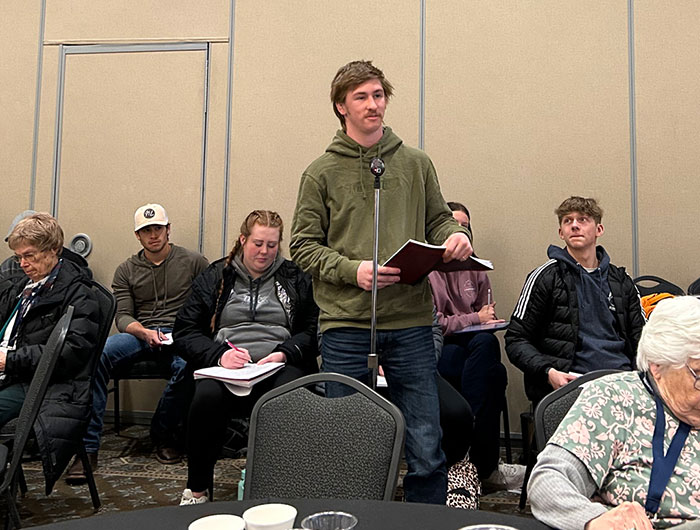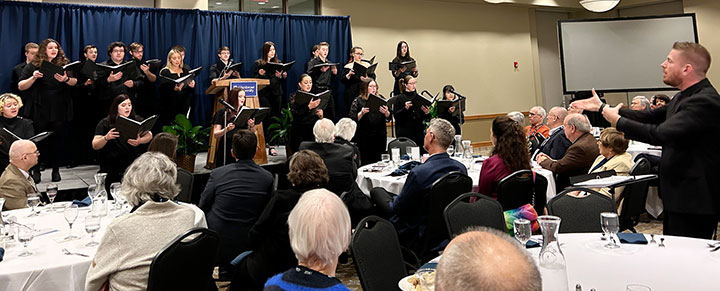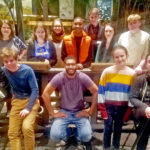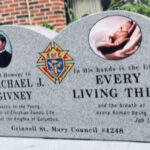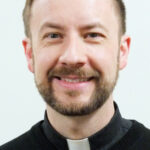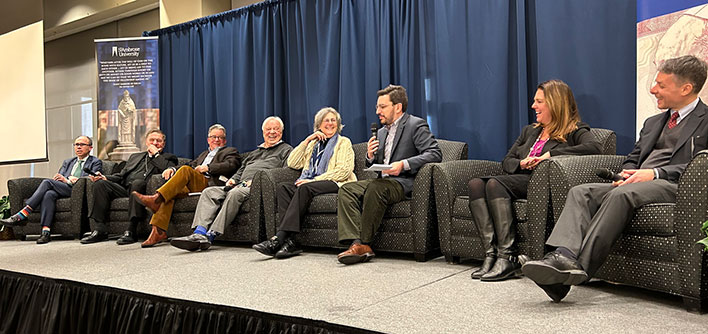
Francis at Ten conference speakers participate in a panel discussion March 18 at St. Ambrose University in Davenport. From left are Anthony Annett, Cardinal Joseph Tobin, CSsR, Austin Ivereigh, Thomas Higgins, Phyllis Zagano, Joshua McElwee, Kerry Alys Robinson and Massimo Faggioli.
By Barb Arland-Fye
The Catholic Messenger
DAVENPORT —Cardinal Joseph Tobin, CSsR, infrequently accepts invitations to speak outside the Archdiocese of Newark, New Jersey, which he leads, but made an exception for “Francis at Ten: a Papacy of Possibilities” at St. Ambrose University. The synergy of distinguished speakers and the Diocese of Davenport’s exemplary approach to a centerpiece of the Holy Father’s papacy — the Synod on Synodality — drew Cardinal Tobin and other internationally recognized speakers to the conference March 16-18.
Pope Francis himself offered his prayers and invoked the “abundant blessings of Almighty God” on the conferees in a letter addressed to Bishop Thomas Zinkula. Archbishop Christophe Pierre, apostolic nuncio to the United States, read the letter to the gathering of 350 people — local, national and international, in-person and online.
The conference began with Solemn Vespers in Christ the King Chapel on campus with Cardinal Tobin, who serves on papal commissions, councils and congregations, presiding. He reflected on the importance of humility, “truly listening to one another and the Holy Spirit,” in becoming a synodal Church. He quoted Cardinal Robert McElroy, who referred to the three essential actions of Jesus: encountering, healing and calling to new life. Synodality “will only be experienced when everyone in the Church recognizes themselves as part of the holy and faithful people of God,” Cardinal Tobin said.
Each keynote speaker shared a unique perspective on the papacy of Pope Francis, which began March 13, 2013, when he appeared on the balcony of St. Peter’s Basilica and “greeted the throng with a simple buona sera” (good evening), Cardinal Tobin said.
“The work of Pope Francis invites all of us to reflect on his call to mercy, justice, fraternity and synodality,” St. Ambrose University President Amy Novak said in welcoming remarks. Since its founding in 1882, the university “has embraced an ethos committed to serving the marginalized, an ethos rooted in a commitment to encounter.”
Pope Francis’ example of encounter — going out to the peripheries to share a meal with the hungry, visit the hospitalized, wash prisoners’ feet, advocate for refugees, travel abroad to promote peace, and engage in interfaith dialogue — served as the scaffolding for the eight keynote addresses and 12 breakout sessions.
Meet people where they are
“His papacy has already proven to be transformative,” said Thomas Higgins, a St. Ambrose alumnus and the primary sponsor and motivating force behind the conference. Pope Francis’ “historic
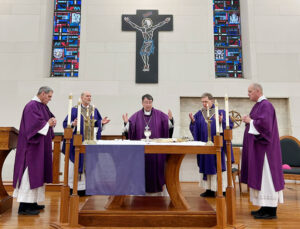
Archbishop Christophe Pierre, apostolic nuncio to the United States, presides at Mass March 18 in St. Ambrose University’s Christ the King Chapel in Davenport. From left are Deacon Dan Freeman, Bishop Thomas Zinkula, Archbishop Pierre, Cardinal Joseph Tobin, CSsR and Deacon Ryan Burchett. The Mass concluded the Francis at Ten conference.
encyclicals, reforms in church governance and transparency, the lifting of those on the margins of society — all of these demonstrate his true leadership. But even more than these achievements, Francis, by his example, has invoked the work of the Spirit in this, our time, to move forward with renewed faith and a joyful heart.” The pope “implores us to meet people where they are and to be inclusive in our evangelical mission, as was St. Paul, the Apostle to the gentiles.” Higgins said Pope Francis is reconnecting the global Church to the visionary teachings of the Second Vatican Council, reminding “us of its great potential.”
“Our Holy Father frequently admits that he benefits more from listening to his critics than his adulators,” Cardinal Tobin noted in his talk. “And, as a good Jesuit, he has no quarrel with a particular examen that helps him not only confront his setbacks but also glimpse the mysterious presence of God in the events of daily life.”
“Synodality, arguably the centerpiece of his service to the Church,” is “an invitation to discover anew the gift that has been given to us, the Holy Spirit so that we will know how to walk together,” Cardinal Tobin said.
“If we want a synodal Church, we need to ask ourselves if we believe that the Spirit manifests freely through all persons and their life stories, even in points of view completely different and diverse from our own positions. The latter is also a mediation of the Spirit that we often forget because it can be uncomfortable to listen, talk and discern in common,” Cardinal Tobin said. “Hence, the art of listening requires formation and experience, as well as to provide the necessary means at our disposal, in order to avoid empty discussions based on opinions or cultural wars.”
Accompaniment is essential in the synodal process even as “it flies in the face of what our society is saying at this time,” Cardinal Tobin said. Accompanying “says you go to each person and treat them in their individuality, you walk with them in grace, you embrace them.”
Synodality and evangelization
Austin Ivereigh, the pope’s biographer, referenced Pope Francis’ encyclicals, books and other writings, including those predating his papacy, to demonstrate the Holy Father’s longtime commitment to synodality even prior to using that term. “A synodal Church is an evangelizing Church,” Ivereigh said, noting that evangelization is the topic of Pope Francis’ current teaching and of this year’s Lenten reflections by Cardinal Raniero Cantalamessa, preacher of the pontifical household.
Ivereigh observed that Pope Francis’ teachings in the first decade of his papacy speak to the interdependence of God’s creation — the relationship of the people with God, with one another and with all nonhuman creatures. In his encyclical “Laudato Si’” (“On Care for Our Common Home”), Pope Francis addresses the three, intertwined relationships and the suffering caused by a rupture in these relationships.
The Holy Father has responded to this “triple rupture, which defines our time, with a triptych of teaching,” Ivereigh said: “Evangelii Gaudium” (The Joy of the Gospel); “Laudato Si’;” and “Fratelli Tutti” (On Fraternity and Social Friendship).
“On a deeply personal level, these ten years with Francis as our pope, has felt like a sign of God’s providence, affirmation and encouragement for so much of our labor,” said Kerry Alys Robinson. She is executive partner with Leadership Roundtable, which promotes best practices and accountability in the management, finances, communications and human resource development in the Catholic Church in the U.S., including greater incorporation of the expertise of the laity.
Robinson firmly believes that “laity, and in particular women, hold the key to positive managerial reform, the restoration of trust in the Church and in Church leadership.” Now is the time for the Church to welcome what the laity uniquely has to offer. “The abuse crisis was the catalyst for the formation of Leadership Roundtable and lay expertise was the resource we did not want to be squandered.”
She acknowledged that Pope Francis is not perfect but takes ownership of his mistakes and makes amends. “When it comes to leadership, Francis emulates what he advocates.” She describes him as a “pope of the people. A pope of surprises. A pope of tenderness. … He prioritizes dialogue and deep listening and seeks out diverse viewpoints.”
Robinson also addressed the synodal experience. “We simply need all voices, all backgrounds, all experiences, all wisdom. And the synod will be as effective as our own responsibility for it.” She singled out the Davenport Diocese for the “leadership and effectiveness of the synodal invitation” in the diocese.
“Let’s be the Church we yearn to see. A more relevant Church to young adults, a more joyful Church, a Church of integrity, ethics, trust, justice and openness,” she said. “A safe environment for the most vulnerable. A Church that values and invites the immense competencies of women. A Church worthy of profound generosity. A Church at the forefront of justice, peace and charity….”
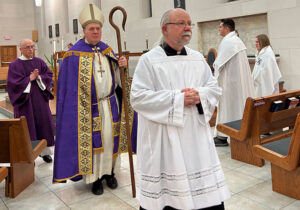
Cardinal Joseph Tobin, CSsR, follows Deacon Frank Agnoli out of St. Ambrose University’s Christ the King Chapel in Davenport after Solemn Vespers, which opened the “Francis at Ten: A Papacy of Possibilities” on March 16. Deacon Kent Ferris follows.
Balancing tension
Phyllis Zagano, who served on the original committee that Pope Francis appointed to study the diaconate of women, offered her assessment of the papacy of Pope Francis in light of the role of women and laity in the Church. She reviewed his encyclicals, as they related to Catholic Social Teaching and his actions and interactions pertaining to women.
The Holy Father, she said, “writes wonderful documents. He’s genuinely a good man. But Francis at 10 sometimes displays the same problems as Francis did at first. He too often insults women, surely unknowingly, with the same sort of old boy jokes and expressions men of his age have heard and used throughout their lives.”
She addressed the Church’s approach to the Synod, expressing some skepticism about whether the hierarchy respects the voice of the laity. She gives credit to Pope Francis for his inclusivity of voices. However, she noted that, depending on the parish, diocese or continent, synodal discernment has been limited. Not so in the Diocese of Davenport, which she singled out. “In the Diocese of Davenport, there are 85,648 Catholics, just 11% of the population. It reports a total of 6,802 synod participants, either in person or online, with some 14,000 comments. The Davenport report mentions women leaders, women deacons, women priests and quoted the comment that women are treated as second-class members of the Church.”
She believes many people have been cut out of the conversation in other places, many of whom are women. “Women are interested in being taken seriously and women are interested in being ministered to by other women,” Zagano said.
Bishop Zinkula, who is involved with the Synod from the diocesan through the continental phase, addressed the tensions the listening sessions have surfaced regarding the role of women in the
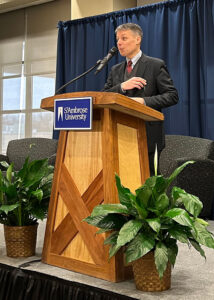
Professor Massimo Faggioli speaks during the “Francis at Ten: A Papacy of Possibilities” conference at St. Ambrose University in Davenport on March 18.
Church, LGBTQ issues, divorced and remarried Catholics, among other issues.
“People have been talking about a tension between truth and love. Love and mercy are at the heart of today’s Scripture readings,” the bishop said in his homily during Mass March 17. “Love is the very essence of God and the central message of the Good News of Jesus Christ. Mercy is the first attribute of God. Mercy has been a consistent theme of Pope Francis during his pontificate.” The Holy Father “embodies love and mercy through his words and actions.”
Bishop Zinkula said, “Tension doesn’t have to be a bad thing. There is a temptation to avoid it by embracing an either/or mindset. But the Church has always been both/and. Catholics are called to strive for synthesis, to hold seemingly contradictory truths in tension. As Pope Benedict XVI said, it all boils down to balance. Are we able to live with the tension of both/and? How is the Spirit inviting us to balance the tension of love/inclusivity and truth/doctrine?”
The common good
Anthony Annett, author of “Cathonomics,” which explores how Catholic tradition can create a more just economy, said Pope Francis’ approach to the market economy is in line with his predecessors dating back to Pope Leo XIII in the 1890s. Annett identified 10 directing principles, based on papal encyclicals of the past 130 years that ought to guide the market. Among the principles: the state has an important role to play in regulating the economy; solidarity, fraternity, reciprocity and gratuitousness must guide the economy; the role of business is not just to maximize profits; the dignity of work and workers’ rights must be emphasized; the goods of the earth are destined for all people.
“We need business to accept a responsibility for protecting the environment and to offer legitimate, sustainable development solutions,” Annett said. “We need consumers to make wise decisions when they are buying and investing.” He noted that Pope Francis is taking up the mantle of St. Ambrose, the university’s patron saint, by emphasizing a responsibility to the common good.
Professor Massimo Faggioli, who teaches theology at Villanova University near Philadelphia, focused on the importance of synodality in the local Church and enlarging the tent of the “field hospital” (a term coined by Pope Francis) at that level. Pope Francis has likened the Church to a field hospital in which healing the wounds and warming the hearts of the faithful is essential before addressing their lesser, though still serious, health challenges.
Faggioli also spoke about synodality and the need to clarify its meaning. Vatican II addressed synodality at the universal level, which opened up important doors in the local Church, he said. “We need to recover a little more of the religious, Christian, Catholic idea of the journey together.” Synodality within the local Church is “more about staying and living together. It’s not an adventure. It’s a home and a family… I believe there is an urgent need to liberate ourselves from grandiose ideas of synodality.”
One document from Vatican II that he believes speaks to the local Church is the Constitution on the Liturgy, which makes the connection between the Eucharist and the local Church. “We celebrate the Eucharist and the sacrament in the local church, in a real church.”
Faggioli referenced the “wounds” in today’s Church — polarization, the culture wars, material wars among them. “What the Church is going through now, and not just the Catholic Church, is that we live in a system where the individual doesn’t feel any longer included…. This has created a culture of talking to the Church rather than talking with the Church or talking as part of the Church,” he said.
He identified a need “to listen, period.” In today’s culture, “you speak before you exist. In biblical culture, it is the opposite. We exist because we have been spoken to by God, by parents, by teachers.” This concept is difficult but necessary to re-inject in the synodal process, he said.
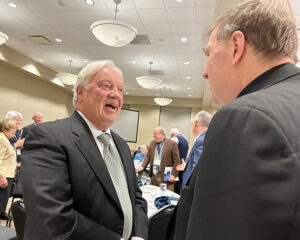
Thomas Higgins chats with Cardinal Joseph Tobin, CSsR, during the “Francis at Ten: A Papacy of Possibilities” conference at St. Ambrose University in Davenport on March 16.
Guided by the light of Christ
Participants expressed appreciation for all of the keynote talks, including one by Joshua McElwee, news editor of the National Catholic Reporter, who covered Pope Francis for his publication for a number of years.
Chris O’Brien, a doctoral student at the Catholic University of America, said his takeaway from the conference was “the unique perspectives on Pope Francis that, together, give a well-rounded view of his papacy.”
Dan Darst of St. Louis, who with six other friends at the conference attended seminary at St. Ambrose years ago, said he takes away a message to “stay hopeful.”
Mo Hart of LeClaire said the conference inspired her to “remain open to the breath of faith and the strength of that breath.”
John Errante of the Kansas City, Kansas, region said after the conference, “I have work to do. I feel called to action.”
He made a new friend at the conference, Daniel Salazar, a senior at St. Ambrose University. The two were deep in discussion when The Catholic Messenger asked for their feedback about the conference. Salazar’s takeaway: “We have allies. We should find ways to work with those allies.”
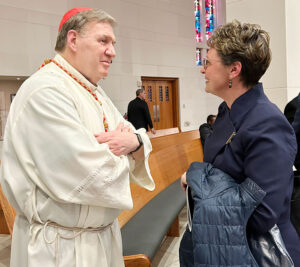
Cardinal Joseph Tobin, CSsR, of the Archdiocese of Newark, N.J., speaks with St. Ambrose University President Amy Novak at the Francis at Ten conference.
The conference concluded with celebration of the Mass, with Archbishop Pierre presiding. In his homily, the apostolic nuncio focused on the Gospel for the fourth Sunday of Lent, the story of Jesus’ healing of the man born blind (John 9:1-41). “Each of us must be willing to let Jesus address our own blind spots,” the archbishop said. “Each of us must be willing to admit, ‘I do not see everything clearly.’”
“As for the healed man in today’s Gospel, so also for us,” Archbishop Pierre said. “Discipleship carries both a challenge and a promise. We do not face the challenges by our own power. The one who is the light of the world will illuminate our hearts with the splendor of his grace so that we may ponder what is pleasing to God and love him in all sincerity.”
Letter from Pope Francis
Letter of Pope Francis to Bishop Thomas Zinkula, read at the St. Ambrose University’s “Francis at Ten: A Papacy of Possibilities.”
“I offer greetings and cordial good wishes to all gathered for the international symposium, sponsored by Saint Ambrose University, marking the tenth anniversary of my election as Bishop of Rome. I thank the speakers and all who worked to make this occasion possible.”
“The symposium takes place as the whole Church is undertaking a synodal journey aimed at renewing the spirit of missionary discipleship in the local churches and enhancing their bonds of communion with the universal Church. This journey is born of the firm conviction that the Holy Spirit is calling the faithful to place their baptismal gifts at the service of building up the Body of Christ (cf. Eph 4:12) and society as a whole.”
“It is my hope that the conversations and dialogue of these days will enable participants to make their own contributions to the synodal process by responding to the promptings of the Spirit and discerning, in union with the Success of Saint Peter, new and creative ways of bearing witness to the joy of the Gospel and of advancing God’s kingdom. Since the Church’s evangelizing mission also entails that of active charity, I trust the symposium will encourage all involved to take concrete and effective steps to serve the most vulnerable of our brothers and sisters, work for greater reconciliation, justice and peace within the human family and care for our common home. In this way, they will be able to proclaim the truth, beauty and love of Jesus Christ not only with words but above all with lives transfigured by God’s presence (cf. Evangelii Gaudium, 259).”
“With these sentiments and with the assurance of my prayers that the conference will bear good fruit, I invoke upon those present the abundant blessings of Almighty God.”
Rome, from Saint John Lateran, 20 February 2023
– Francis








